Let’s do a quick check in:
• Is there a smartphone in your pocket?
• Music in your ears?
• Do you have two, three or 20 browser tabs open with articles you plan to read?
• Have you received a notification in the last minute or two?
If so, welcome to the age of distraction and disruption!
As Jane Brody states:
“We’re constantly bombarded by bells, buzzes and chimes that alert us to messages we feel compelled to view and respond to immediately.”
Now here’s the thing we can sometimes forget …
Reactive is never productive.
Reactive leaves you feeling unfulfilled and dazed.
Reactive makes you feel a little manic and confused.
So it’s time to reclaim your focus. But how?
Two words:
In his brilliant book Digital Minimalism: Choosing a Focused Life in a Noisy World Cal Newport defines Digital Minimalism as follows:
“A philosophy of technology use in which you focus on your online time as a small number of carefully selected and optimised activities that strongly support the things you value, and then happily miss out on everything else.”
In short, it’s about carefully choosing what tech tools (e.g. social media, websites and apps) you want in your life. And then deciding how you’ll extract the most value from them.
Here are three questions Digital Minimalists consider:
1. What tech tools do I want to use?
2. Why am I choosing to use these tools?
3. Under what conditions will I use these tools?
As you can see, Digital Minimalism isn’t anti-tech. Far from it. And it’s certainly not about abandoning technology altogether.
But as Henry David Thoreau famously said:
“Men have become the tools of their tools.”
They can undermine our productivity, relationships and wellbeing and drive us away from the things that make us feel grounded as humans.
One has to stop and wonder why a number of Silicon Valley tech giants (including the late Steve Jobs) refuse to let their children use iPhones and iPads.
Digital Minimalism acknowledges that technology has a place in our lives and can make our lives much better. But we can’t let technology invade every aspect of our lives.
Here are 15 ideas and strategies I learnt from reading Cal Newport’s book Digital Minimalism:
Consider every time you post something on Facebook or Instagram, it’s like you’re playing the pokies. You’re thinking to yourself, “Will I get any likes?” and “What if no one comments?”.
Posting is like gambling. You see, you don’t really know what you’re going to get. And this is what drives you to keep checking.
If you find yourself checking your phone a lot, it’s not because you’re lazy and undisciplined. Billions of dollars have been invested to make you addicted to particular apps. Your ancient neural networks are being exploited. The more time you spend on these apps, the more money these companies make.
Too many devices and apps can destroy the quality of your everyday life and clutter your time and attention. There’s value in cutting back to what you really need.
If you want to get clear on the tech tools that best serve you, then you’ll need to attempt a digital declutter. Follow these 3 steps:
1. Set aside 30 days to take a break from optional technology (i.e. any apps, websites and tools that won’t harm your personal or professional life).
2. Explore and rediscover activities and behaviours you find satisfying and meaningful.
3. After 30 days, reintroduce optional technology back into your life (keep only what provides value).
The human brain need regular doses of quiet times, where it is free from the input of:
• podcasts
• television
• books
• phones
• people
Leave your phone at home and go for a walk. Listen to the sounds of nature. Notice what thoughts and feelings come up.
The human brain evolved to crave rich social interactions. It is both unhealthy and insulting to replace face-to-face conversations with text messages and likes. You need to prioritise real conversations with people, even if it’s uncomfortable and inconvenient.
Cal Newport says:
“See it [the like button] as poison to your attempts to cultivate a meaningful social life.”
Before you click like on a picture of your friend’s newborn baby, stop. Consider picking up the phone to call them or delivering them a meal instead.
This one is a challenge but again, the aim is to have real conversations with people. As Cal Newport puts it, we want to ‘eliminate trivial interactions’.
Can you pick up the phone and chat to the person instead? One phone call is likely to strengthen your relationship more than 50 likes or social media interactions.
Have Do Not Disturb or Airplane mode as your default setting. Commit to responding to text messages in batches several times a day. You may need to train people not to expect an instantaneous response from you but they’ll soon get used to this.
Call up your friends and invite them round to play some board games. Any face-to face interaction that results in a sense of excitement and plenty of belly laughs is good for the soul.
Most people engage in low quality leisure (e.g. web surfing and watching random videos). These leisure activities do little to help us flourish and re-energise.
What does high quality leisure look like?
Challenging yourself to develop some new skills.
Here are some examples:
• Learning a new instrument
• Learning a foreign language
• Writing a blog post
• Doing a free online course
• Learning to cook a new dish
• Learning basic bicycle maintenance
And yes, it’s okay to use technology to help you do these things (e.g. DIY videos on YouTube). But technology won’t always be required.
Since becoming a Digital Minimalist, I’ve been learning to play the piano from a book called How to Play the Piano. There’s something really satisfying about sitting down at a piano without my phone and learning to play a piano masterpiece by Bach. As the author James Rhodes states in the book:
“When you’re sitting there at your keyboard, you’re not going to be tweeting or liking Facebook posts, nor are you going to be assaulted by adverts, eating fast food, staring at cat videos online or watching America’s Next Top Model. It’ll be you, focused, immersed, losing time in a good way, tapping into that potential we all have to release our inner creativity.”
We all need a little time in our day for mindless activities. But be intentional about it. Schedule a set time to watch random videos and scroll through social media. But once your time is up, that’s it. No more.
To become a Digital Minimalist, you don’t have to delete your social media accounts. Instead, you create operating procedures that specify how and when you will use social media.
For instance, you could block yourself from using Facebook for most of the day but allow yourself 20 minutes from 6pm – 6.20pm. Or you could have a rule of only using social media on weekends.
For starters, take social media off your phone. It’s far too easy to check it in moments when you’re feeling bored. If you must check it, make yourself only use it on your computer.
Think about what groups or pages you want to look at, what people you wish to follow, etc. You can bookmark key pages on Facebook so you bypass all the junk and head straight to what interests you (this simple act could save you hours of time).
You want to stay informed about what’s going on in the world, but you don’t need to read every news article (Fake news? No thanks!). And you certainly don’t want to get derailed by trashy news and click bait. Decide on what sources you want to get your news from.
You can use tools/apps to strip the article of ads and clickbait. Then, choose a time and place where you can read these articles without being distracted.
I use an app called Pocket to curate a newsfeed of stories from quality news sources such as the ABC, The Conversation, SBS, and The Guardian. I then set aside a little time each day to read these articles on my tablet (free from distractions).
Do these ideas sound a little extreme? Well, they’re not.
What’s extreme is …
• 80% of year 11 students using their phones throughout the night when they should be getting restorative sleep.
• The average Australian spending 10 hours a week on Facebook (that’s 520 hours a year).
• Couples with phones out at dinner (not talking) but sending messages to others throughout a meal.
• People walking to work with their eyes on their phones instead of their surroundings.
These behaviours are now the new norm but we didn’t evolve to live like this.
By getting rid of all the digital clutter in our lives, I believe we become better humans and have better relationships. Without all the noise and with focused intention, we can lead better, more fulfilling lives.
Share This:
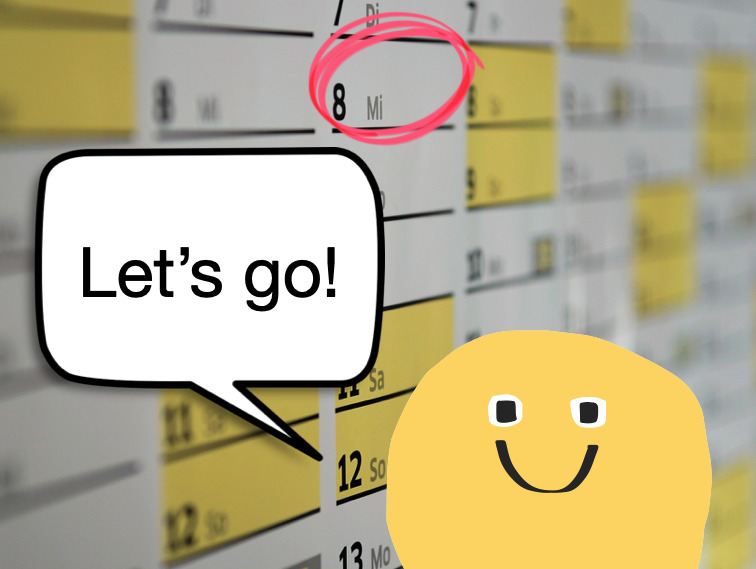
But how much time do you actually have?
It’s hard to get a sense just by thinking “My exam is in three weeks.” After all, three weeks sounds like plenty of time, right?
Don’t be fooled. This is your brain playing tricks on you.
No one ever has a full three weeks (504 hours) to prepare for an exam. Thrown into the mix is time for sleep, getting ready for school or work, working on assignments, socialising with friends and family, etc. Plus, you usually have more than one exam to study for.
But we can forget this. And when we do, we end up procrastinating with our work and it piles up for our future selves to deal with.
What’s missing is that your brain needs clear visual feedback. It needs to have a sense of the big picture (i.e., all your commitments laid out in front of it).
By using a year-at-a-glance calendar.
Earlier this year, I printed out a massive year-at-a-glance calendar (A0 size).
I scheduled all my upcoming presentations, holidays, important events (e.g., birthdays), deadlines, etc., onto the calendar and placed it in a prime position where I couldn’t miss it.
This calendar has made all the difference. It grounds me in reality, helps me feel more in control of my schedule, and gives me clear visual feedback. It also makes me think twice before I agree to take on a new project.
In the past, whenever I’ve said yes to a new opportunity, I haven’t always been grounded in reality. Too many times, I’ve been unintentionally cruel to future Jane.
Let me explain . . .
Back in 2016, I was on the home stretch with my PhD. The path forward was clear. After years of struggling with my PhD, the end was in sight. I was on track to hand in my thesis in a few months’ time.
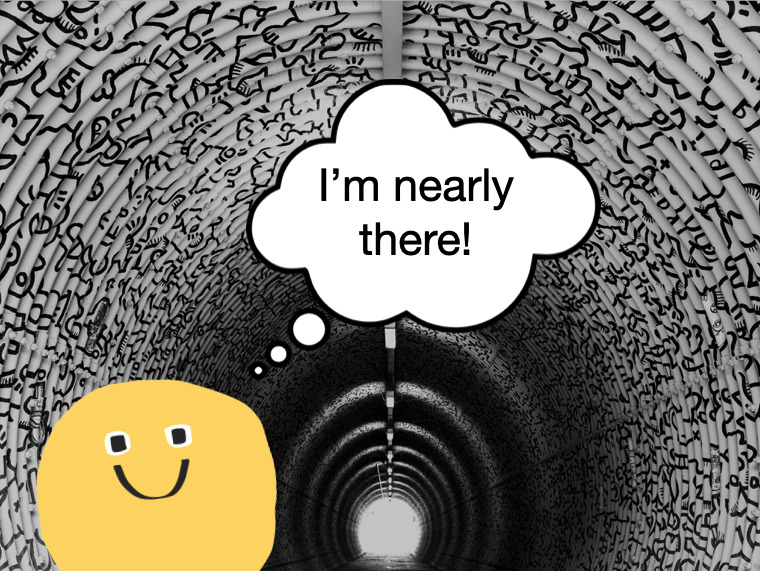
But then something happened that threw me off course (well, erm, I threw myself off course).
I was asked by a company to run a series of workshops. Without even thinking, I said “Yes! I’d love to!”. It seemed like a great opportunity. One that was too good to pass up.
When I shared the news with my PhD supervisor, she seemed to think differently. Her face said it all: a mixture of concern and confusion.
“Why did you say yes to this? Do you need the money? What about your PhD? You’re so close to finishing”, she said.
The truth was I didn’t need the money. I said yes because without having my other commitments staring me in the face, I had all the time in the world. I was engaging in magical (delusional) thinking. I fantasised about having superhuman capabilities and being able to do it all.
I was wrong. There were only so many hours in the day, and something had to give.
To cut a long story short, pretty quickly the magical thinking wore off, and I regretted taking on the job. I had burdened my future self with a ridiculous amount of work and unnecessary stress.
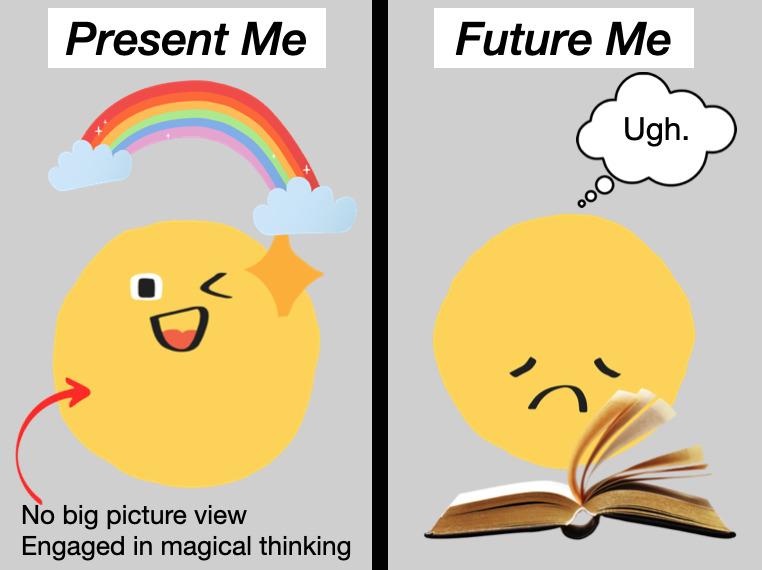
But worst of all, I had delayed handing in my thesis by several months. A few months might not sound like much in the big scheme of things. But when you’ve been plugging away at a PhD for seven years, every month becomes precious. I risked losing momentum.
If I could teleport back in time and place a year-at-a-glance calendar in my office space, I like to think that I would have prioritised my PhD over the shiny new opportunity.
I recently finished reading an excellent book called ‘The Extended Mind: The Power of Thinking Outside the Brain’ by Annie Murphy-Paul.
In this book, Annie explores nine principles for expanding our intelligence (note: these principles are not taught in schools). She argues that instead of pushing our brains to work harder and harder, we can use our bodies, relationships, and surrounding environment to boost our cognitive abilities.
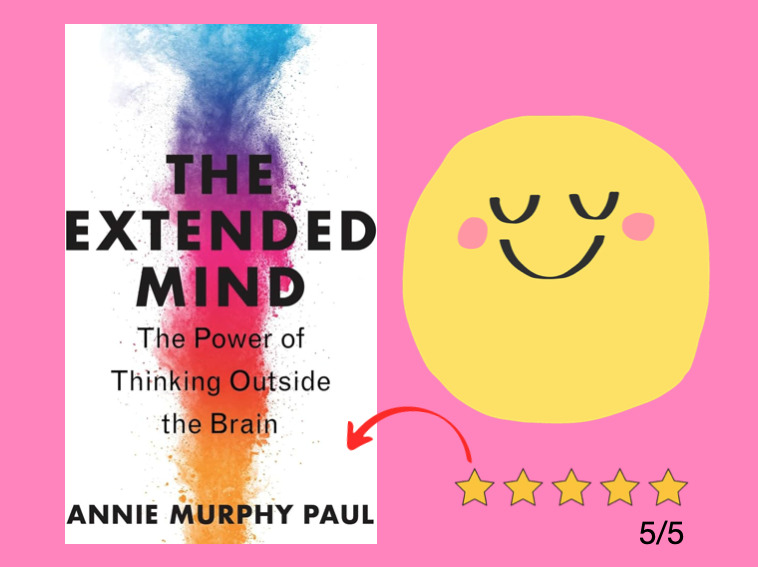
In the chapter called “Thinking with the Space of Ideas”, she writes:
“Whenever possible, we should offload information, externalize it, move it out of our heads and into the world. It relieves us of the burden of keeping a host of details “in the mind,” thereby freeing up mental resources for more demanding tasks like problem solving and idea generation.”
After reading this book, I understood why a year-at-a-glance calendar can be such a powerful tool. Seeing all your projects and commitments in one glance allows you to think smarter and more strategically.
These calendars also help to orient you in time. You can see how much time you have between now and doing the things you need to do.
Your projects and deadlines stare back at you every day. There’s no escaping them.
Seeing your life in this way also helps you to plan and pinpoint busy periods.
Here’s an example . . .
This month, I have more presentations scheduled than usual. This means I need to manage my energy levels, prioritise sleep, and eat healthily.
But a quick glance at my calendar tells me I have a few ‘free’ days before all these talks begin. I can use this time to cook a few meals to pop in the fridge and freezer to make life a little easier during this busier period.
One of the worst things I can do when I get busy is order takeaway food and sacrifice sleep to work. I refuse to do it as it always backfires. If I’m functioning at half capacity, my talks and work will suffer.
These calendars can also provide useful information to help you manage your energy levels, reduce ridiculous workloads, and avoid burnout.
Earlier this year, there was a week when I delivered more talks than usual. During this week, I found myself taking 15-minute power naps between talks to recharge before the next one. Even with all these power naps, by the end of the week, I felt tired. I drew a tired little emoji face on my calendar to represent this.
That tired emoji face is a constant reminder: you have mental and physical limits. Don’t overdo it.
It’s important to find a calendar that is both aesthetically pleasing and functional for you. This means you probably can’t just go to the shops and pick something off the shelf.
You could order a hard copy calendar online, but when the year is already well underway who wants to potentially wait weeks for their calendar to arrive in the mail?
You can purchase a digital download online and take it to your local print shop on a USB stick. Some templates display the month as a long list of days; whereas other calendars group the month into weeks, with each week on a separate line (see examples below).
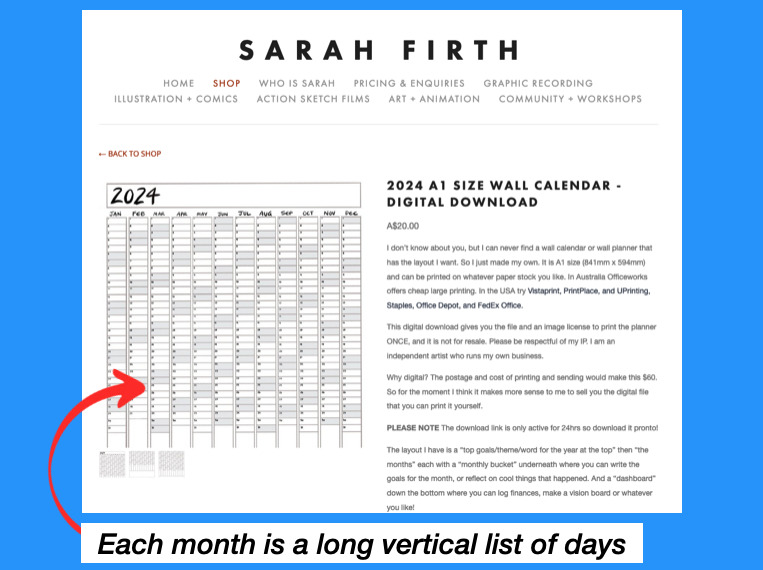
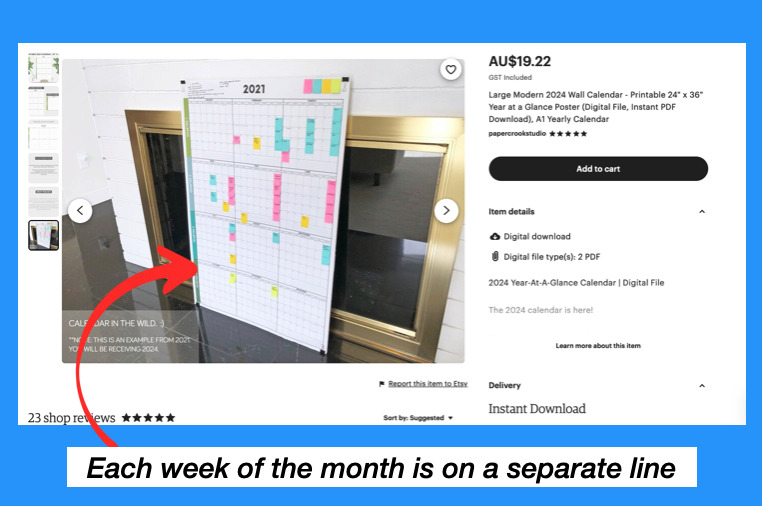
Alternatively, you could buy a monthly calendar, cut it up, and stick it together.
One of my friends suggested I try doing this. I gave it a shot, but my calendar looked like a failed arts and crafts project (with messy bits of tape plastered everywhere). Plus, the boxes were too small and cramped my style.
After some trial and error, I purchased a digital download from Etsy for $20AUD and printed it A0 size for $10AUD. All up, my calendar cost me $30AUD – money that was well spent.
The bottom line is you have to figure out what works for you and how much you’re willing to spend.
• Write on the calendar when all your exams, appointments, special events, and major projects will take place.
• If you don’t yet know the specific dates of each exam, note the week they begin and assume the worst-case scenario (your exams will be sooner rather than later).
• Consider laminating your calendar so you can use whiteboard markers on it.
• If laminating is too expensive, use sticky notes and washi tape instead.
• You can mount your calendar on core-flute material or foam board to give it a sturdier structure.
• Resist the urge to put every detail on your calendar. Focus on the big project deadlines, appointments, exams, etc. The details for what and when you work on each project can go into your weekly planner and/or on your to-do list.
• If you have the wall space, consider printing your calendar A0 size (841mm x 1189mm). You want plenty of space to write in each box.
In our noisy world where we are bombarded with endless opportunities, many of us would benefit from embracing analog tools like the year-at-a-glance calendar. These calendars help to ground us in reality and focus our minds on what matters.
If you have a lot going on in your world and find yourself saying “Yes!” to every shiny new opportunity that comes your way, do yourself a favour and create a year-at-a-glance calendar. Having your commitments stare you in the face every day is a simple but powerful way to live with greater focus and intentionality.
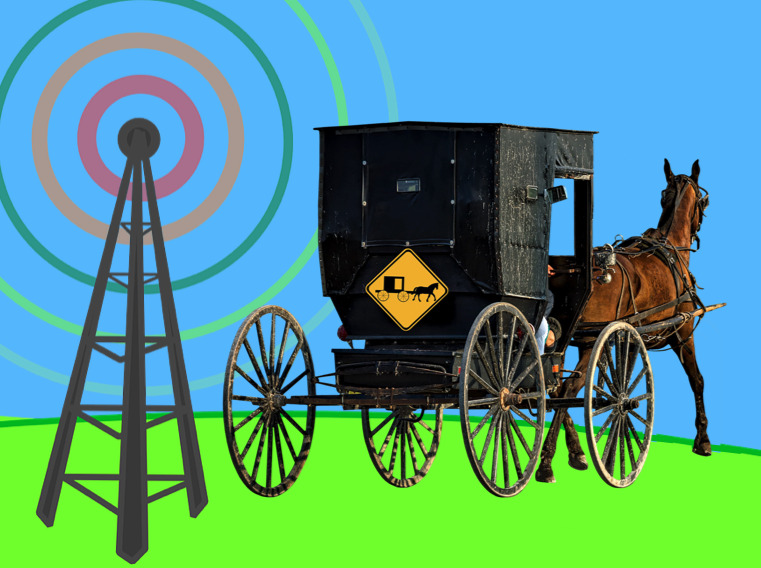
If I’m honest with myself, there was a time when technology was doing me more harm than good.
On Facebook, I frequently fell into the comparison trap (comparing myself to people who had posted delicious dinners, amazing holiday photos, etc).
On Twitter, I’d get baited by trolls (and I’d foolishly take the bait).
Throughout the day, I’d constantly check my phone and email, which left me feeling jittery and chaotic.
Big Tech was constantly hijacking my time, energy, and attention. Every time I retreated to my devices for a quick shot of dopamine, I moved further away from my goals. I didn’t like this, and I knew something needed to change.
Over the past three years, I’ve implemented many practices to regain control of my time, energy, and attention (including deleting all social media).
These practices have made a big difference in my life. But I’m well aware that not everyone feels the same way I do about Big Tech, nor are they in a position to be able to delete all their accounts.
Following a school presentation, I spoke with a small group of year 8 students. I shared with them that I didn’t use any social media, to which a year 8 girl quickly chimed in:
“My grandma has Facebook. What’s your excuse?”
Her words struck me like a bolt of lightning. I didn’t know what to say.
It highlighted how adopting these apps is the norm for a young person.
When everyone else has a smartphone and is using social media (including your parents and grandparents), why would you question using them?
I couldn’t forget the year 8 girl’s words. While I appreciated her candidness, it left me slightly disturbed.
At the same time, it increased my motivation to resist Big Tech. I started searching for role models: people actively resisting Big tech and this hyperconnected, fast-paced way of life.
One community kept popping up in my research: the Amish.
The Amish are often portrayed as being technologically impaired. A classic example is Weird Al Yankovic’s music video Amish Paradise (a parody of Coolio’s mega-hit Gangsta’s Paradise).

In this video, Weird Al sings:
I never wear buttons but I got a cool hat
And my homies agree I really look good in black, fool
If you come to visit, you’ll be bored to tears
We haven’t even paid the phone bill in 300 years
But we ain’t really quaint, so please don’t point and stare
We’re just technologically impairedThere’s no phone, no lights, no motorcar
Not a single luxury
Like Robinson Crusoe
It’s as primitive as can be
While the Amish still mainly travel by horse and buggy and shun many modern technologies, such as televisions, radios, and cars, they are not ‘technologically impaired’ as Weird Al makes out.
When it comes to cultivating healthy digital habits, there is a lot we can learn from the Amish.
The Amish have a set of strategies that guide the adoption and use of different technologies. These strategies have allowed them to avoid being pawns for the goals of Big Tech companies, which make massive profits by seizing people’s attention.
I recently read a fascinating book called Virtually Amish, written by Dr Lindsay Ems. For her PhD research, Dr Ems spoke to Amish people about their relationship to modern technology (e.g., smartphones).
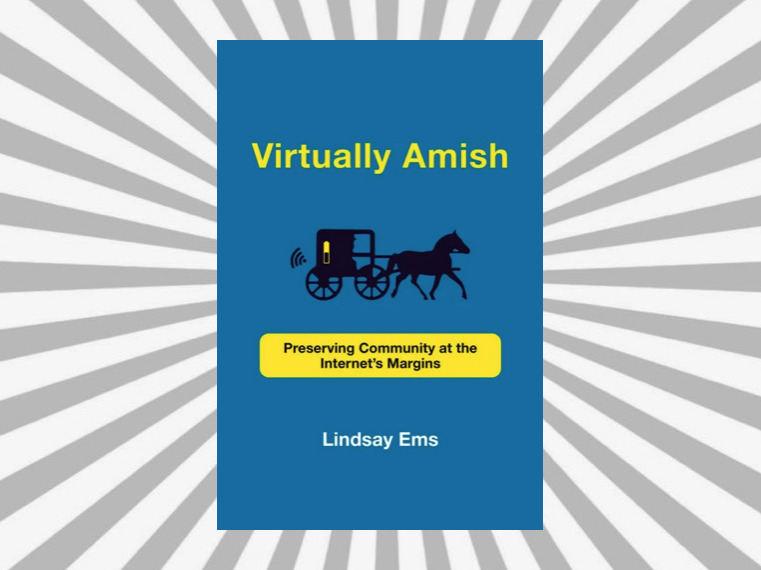
She argues that the Amish take control of their tech tools and thrive. Through adopting similar practices, we can thrive, too.
Below, I share how you can thrive by emulating Amish practices and beliefs around technology:
The Amish are not technophobes. They are ‘technoloselectives’.
They carefully consider the tech tools they’ll adopt and their functionality, tweaking them to help them achieve their goals.
The Amish don’t mindlessly purchase the latest gadgets and gizmos. Instead, they think about their values and goals and how the technology could cause unintended harm to themselves and the wider Amish community.
What are your goals?
Do your tech tools help you achieve them, or do they distract you from them?
The Amish are guided by their values (i.e., the things that are most important to them). Their values underpin everything they do.
So, what exactly do Amish people value?
• Community
• Connections with others
• Living a simple and slow-paced life
• Living a spiritually rich life
• Being self-sufficient
The Amish use these values to guide their adoption of technology.
An example of this can be seen with the arrival of the home telephone (not smartphone). Dr Ems shares how the Amish decided to ban the telephone from being inside the family home.
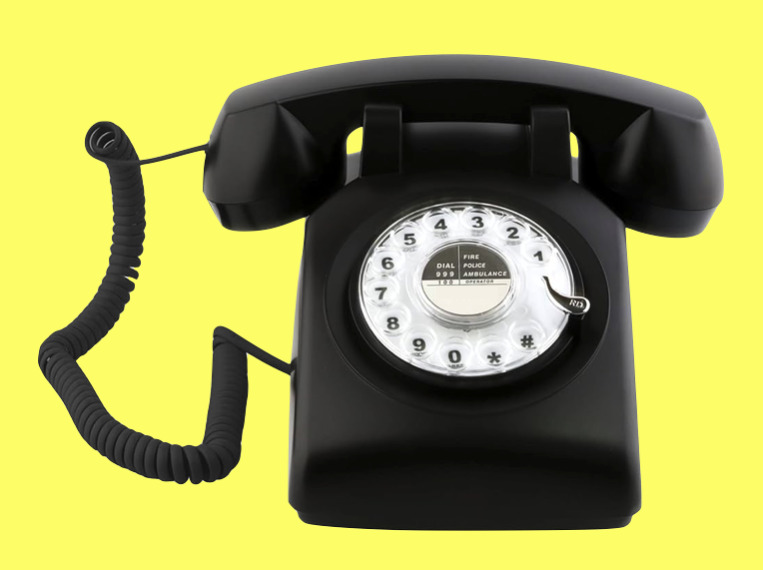
This ban came about after careful consideration and reflection on their values. The Amish value connections with family, friends, and the community. They don’t want to be the kind of person who interrupts a conversation by answering a telephone call. For this reason, telephones are located outside Amish family homes or nearby.
What are the things that are most important to you?
How does technology impact on those things?
Does it enrich those things or diminish them?
The Amish understand that technology can cause harm. Subsequently, they intentionally delay adopting new technology until they see its impact on others.
Does it destroy family life? Does it wreak havoc on their ability to pay attention and distract them from their spiritual life?
If so, the technology threatens their culture and religion, and for these reasons, it should be avoided.
Before adopting a piece of technology, the Amish need to be clear about two things:
1) The functionality of the technology (what it can do)
2) The potential social impacts of the technology
Once they deeply understand these things, it is then decided whether the technology is adopted or not.
It may come as no surprise that Amish people view the smartphone as an incredibly dangerous innovation. Many Amish communities have bans on this device.
How do you feel after spending time on social media?
Have you seen things posted on social media that weren’t true or were exaggerated?

When an Amish person wants to use a new technology, that technology will go through a formal decision-making process.
The community (in particular, the leaders) will consider the future with this technology. They’ll try to imagine how the technology could change their way of life.
Questions the Amish reflect on include:
• What are the advantages and disadvantages of the technology?
• What might come with it that we might not anticipate?
• Could someone get addicted to it?
• Is it a need or a want?
• Can the technology be restrained?
In her book Virtually Amish, Dr Ems provides the example of an Amish business owner asking the community leaders if he could have permission to use a label maker for his business.
After careful consideration, the leaders ruled label makers could be allowed for the following reasons:
• They are not addictive
• They can’t be used for recreational purposes (e.g., playing games or entertainment)
Think of a new technology (device or app) you want to adopt. Could it become addictive?
Many Amish people believe the issue is not whether you use a smartphone or social media but how you use it. It’s important that the Amish remain in control of their use of tech and place limits on it.
It’s also important that the technology is not visible (i.e., you don’t pull your smartphone out in Church or during a conversation). Being discrete in the way one uses technology shows respect for Amish values.
How do you use the tech in your life?
Are you in control of your use?
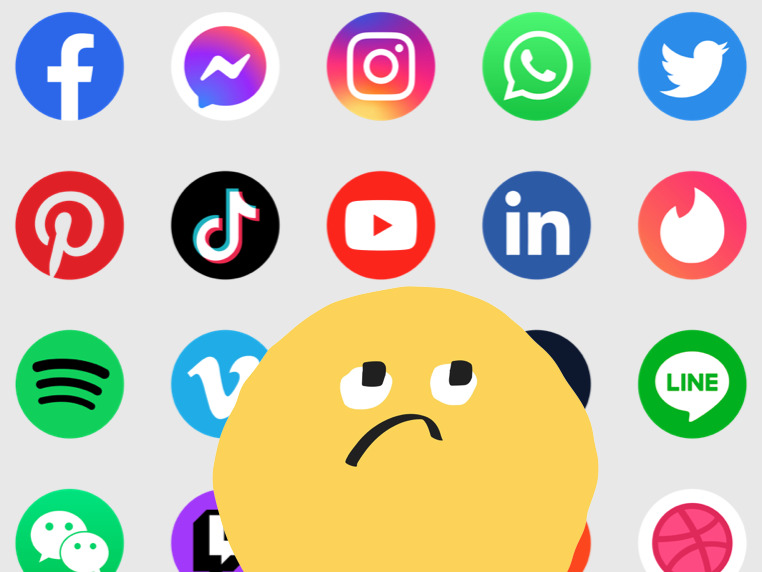
Amish people think about not just how they use the technology but what kind of person they become when they use it.
This point resonated with me deeply. I can’t say I’ve always liked who I become when I use certain technology.
A few years ago, I babysat my friends’ children when my friends went out for a kid-free meal. I look back and cringe when I think about how the experience unfolded.
Before going to my friend’s place to start babysitting, I got into a heated text discussion with some people in a group chat. Things were said that upset me.
For most of the night, I was on my phone, texting back and forth, not present with these young children. At one point, the little boy tugged on my arm to get my attention. “Aunty Jane, come play!” he said.
What can I say? I felt terrible. This certainly was not my finest moment. I had become the kind of caregiver I am usually quick to judge: distracted and disengaged.
I vowed to avoid trying to resolve issues by text and leave my phone at home next time to be fully present with the kids.
When you use social media, what sort of person do you become?
The Amish take modern tech tools and modify them to help them achieve their goals.
The plain mobile phone is an example of this. Amish people have created a mobile phone that can only make calls. It doesn’t have a camera, games, access to the Internet, or the ability to send text messages.
Similarly, the plain computer allows Amish to make spreadsheets, do word processing, and construct simple drawings. This allows them to complete tasks without being distracted by other things.
In other words, the Amish create what David Kadavy (author of Mind Management, Not Time Management) would refer to as sticky tools. A sticky tool allows you to stay focused on a task without getting distracted.
What sticky tools could you consider adopting (e.g., a basic flip phone and Internet blocker app)?
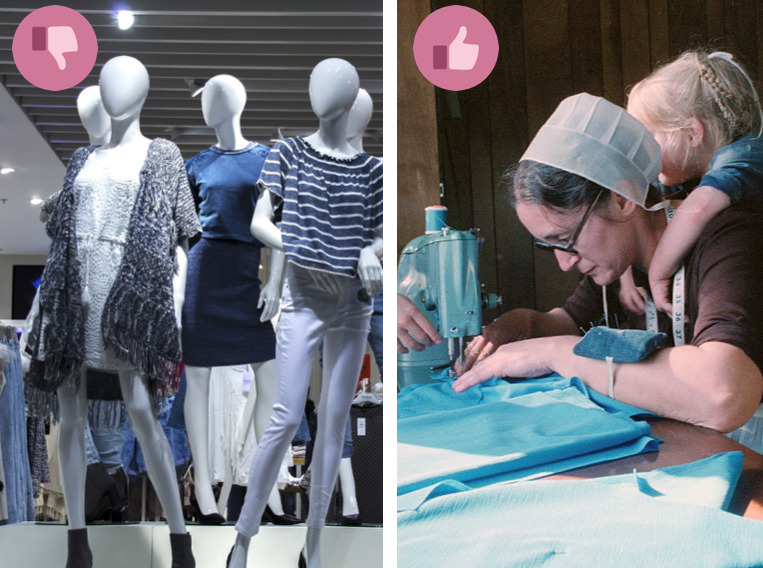
The Amish take pride in growing their own food, raising barns, baking their own bread, tinkering with robotics, inventing, and making their own clothes. They are not big consumers, but they embrace a simple lifestyle and encourage human creativity.
In the modern non-Amish world, many of us are doing the polar opposite of this. We have fallen into the trap of consuming content mindlessly online (e.g., watching people bake bread instead of baking our own bread).
Don’t get me wrong—the Internet is an excellent learning tool to help us build our skills. I have turned to YouTube for many instructional videos on how to make and fix things. But doing this requires discipline because it is all too easy to get derailed by other distracting videos.
The bottom line is this: the more time we spend online, the more ads we are likely exposed to and the more our consumptive desires are stirred up. Is it any wonder so many people feel so dissatisfied with their lives?
Instead of mindlessly consuming, what can you create today?
The Amish embrace tech with inbuilt friction. In fact, inconvenience is considered a virtue.
Dr Ems shares that many Amish technologies intentionally contain ‘speed bumps’ and ‘friction’. The reason for this friction is to prevent Amish people from wasting time on the device.
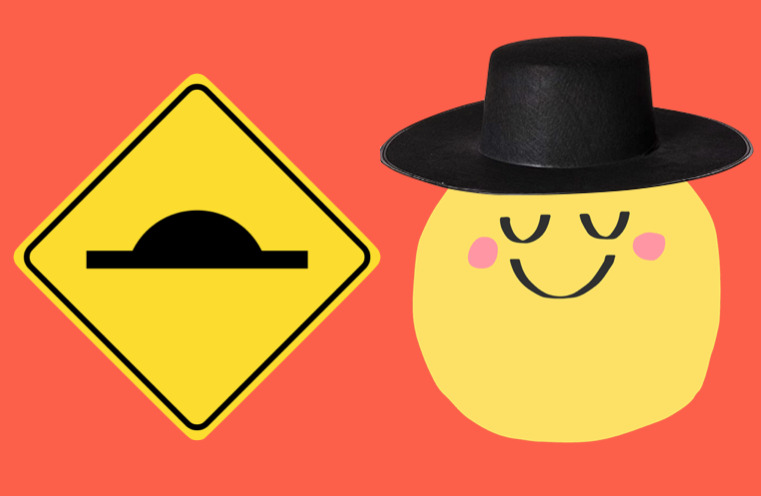
I’ve found this is one of the positives associated with using a ‘basic phone’.
Last year, I experimented with using a basic flip phone with limited functionality (I could only make calls and send texts). Texting on this phone was so painfully slow that it made me want to avoid getting into long text discussions with people. It was easier to pick up the phone and call people.
Using a smartphone to text your friends may be easier than making a phone call, but as the Amish strongly believe, easier is not always better.
How can you build friction into your tech use?
Can you embrace analog alternatives to decrease your screen time?
How much control do you have over your time, energy, and attention? As Chris Bailey writes in his book How to Calm Your Mind, “On the Internet, our intentions very quickly slip from our grasp.”
If you want to thrive online and offline, consider adopting some of the tech habits of the Amish. By limiting their tech use, the Amish have been able to remain mentally free and protect their way of life.
If more of us adopted Amish tech practices (e.g., being intentional with our tech use and placing limits on it), we’d most likely feel calmer and less anxious. We’d also spend more time engaged in activities that bring us joy and are aligned with what we value.
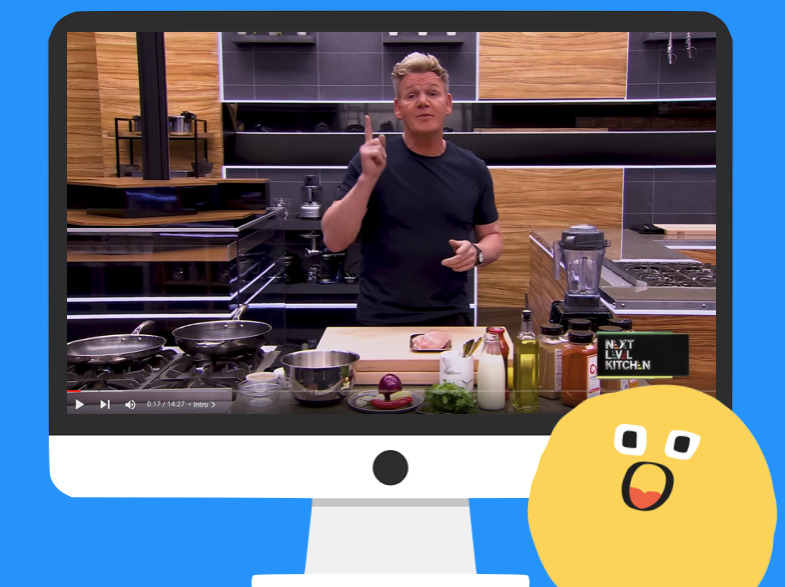
I recently watched a video of Gordan Ramsey cooking a ‘curry in a hurry’ (a butter chicken dish).
I was spellbound by the way Ramsey seamlessly cooked this dish. He was in flow and fully focused on the task of cooking the butter chicken.
What allowed him to whip up this dish plus a serving of rice in under 15 minutes?
Being organised helped a lot. Before he started cooking, chef Ramsey had all the ingredients and cooking utensils out on the bench, ready to go.
In chef’s speak, he had prepared the mise en place.
Mise en place is a culinary skill that can help us to study and work more efficiently. In this article, I explore this concept and how you can apply it to your life to help you stay calm, focused, and in control of your studies.
The mise en place is a French term that translates to “putting in place”. It means a place for everything and everything in its place.
Everything the chef needs is within arm’s reach. When it’s time to start cooking the dish, the chef knows where everything is. This allows the chef to focus on cooking the dish and stay calm and grounded under pressure.

In the book Kitchen Operations (a textbook for hospitality students and apprentice chefs), the authors write about the importance of being organised in the kitchen. They state:
“The ability to work in an organised manner is possibly the most important quality that anyone working in the preparation and service of food can demonstrate. You must develop this ability to complete the expected workload in the time available. Failure to be methodical in your approach will reduce efficiency and will lead to feelings of stress and frustration.”
The mise en place helps the chef avoid unnecessary stress and frustration.
Imagine the following scenario . . .
A chef starts cooking a pasta sauce.
The chef realises 10 minutes in that he is missing a key ingredient (tins of tomatoes).
The chef has to run to the shops to buy the tomatoes.
Chefs can’t afford to have that happen. They are time-pressured. They need to get meals out quickly to hungry customers.
The mise en place helps chefs avoid stressful situations like this. It can also help you decrease unnecessary stress, drama, and frustration associated with homework and study.
Before starting your work, set yourself up with everything you need to complete the task.
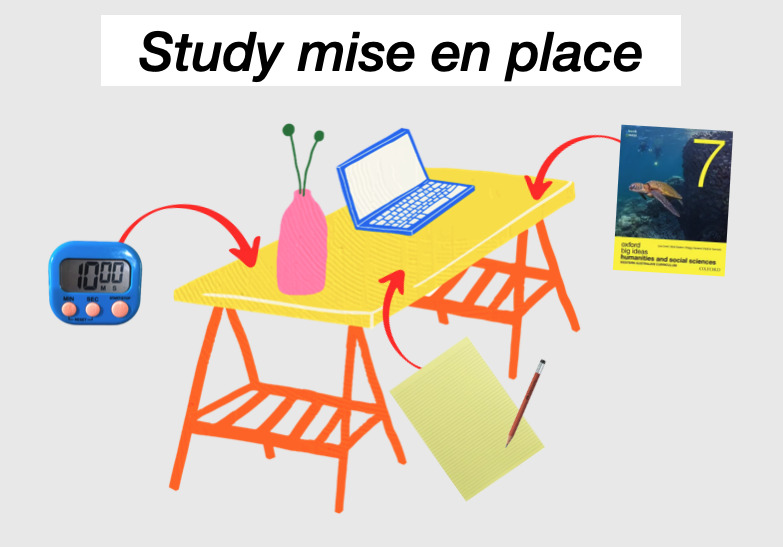
Think of this as the study desk mise en place. Ideally, you want to have a dedicated study space where everything is already set up. This saves you time, as you don’t have to set things up and pack things away after each study session.
But your desk isn’t the only space you can set up and prepare. In the world of study, you have other spaces you need to manage (e.g., a computer, school bag, pencil case, and locker). With each of these spaces, you need to ask:
“What items do I need in this space for my work to flow smoothly?”
It also helps to ask:
“What items don’t I want in this space?”
Just like a chef doesn’t want cockroaches, cats, and rats running around the kitchen and restaurant (or a visit from the local health inspector), there are things you want to keep out of your study space.
Remove anything that throws you off your game (i.e., makes you feel bad, distracted, overwhelmed, and upset) from your study space.
Here’s my list of things I want to keep out of my study space:
• My smartphone
• Long to-do lists
• Visual clutter
The point is to remove any friction points from your environment (anything that will slow you down and make it difficult to do your work).
The mental mise en place cannot be overlooked. This is the mental preparation part of the study process.
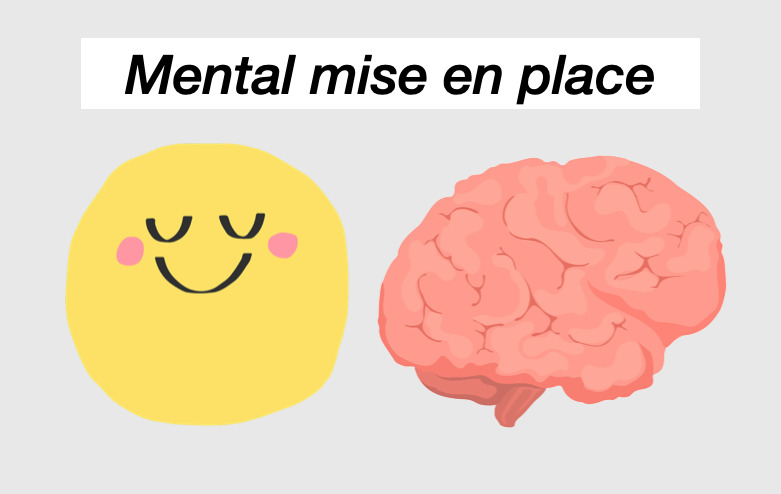
Ask yourself:
What must I do to mentally prepare myself for deep work/study?
Most of us can’t just scroll on our social media feed for an hour and launch straight into doing focused study. We need to get into the right headspace.
To be clear, I don’t mean you need to feel motivated, inspired, or in the right mood to study. Too often, we wait for motivation to strike, and it never comes. However, it certainly helps to be calm, focused, and grounded.
My mental preparation for the workday starts the evening before. Too many late nights have taught me that to wake up feeling calm and grounded, I need to go to bed at a reasonable hour.
When I wake up, I protect this mental calm by:
• Going for a walk or lifting heavy weights
• Doing a mini meditation (usually 3-5 minutes)
• Eating a healthy breakfast
• Avoiding checking my email and touching my computer first thing
• Journaling or mind mapping with pen and paper
I stay away from screens for as long as possible. This is essential for cultivating a calm mental state where I feel proactive and in control of my day.
I know I’m in trouble if I skip too many of the things on the list and start the day by checking my email. It becomes much more challenging to focus and get things done.
What is a pest of the mind?
It is anything that overstimulates the mind and leaves one feeling frenzied, scattered, and/or jangled.
Here’s the thing about learning information at a deep level: it requires you to slow down. You cannot rush it, like a 15-minute butter chicken dish.
But we engage with people, places, and things on a daily basis that speed up our thinking. In this overstimulated, wired mental state, learning feels like a hard slog.
Here’s a tip: start to notice the things that leave you feeling overstimulated. It can be incredibly liberating to cut back on these things or eliminate them completely from your life.
I am constantly tweaking my workspace and experimenting with different tools to help me click into a state of flow with my work. Here are some tools that I’m currently enjoying having as part of my study mise en place:
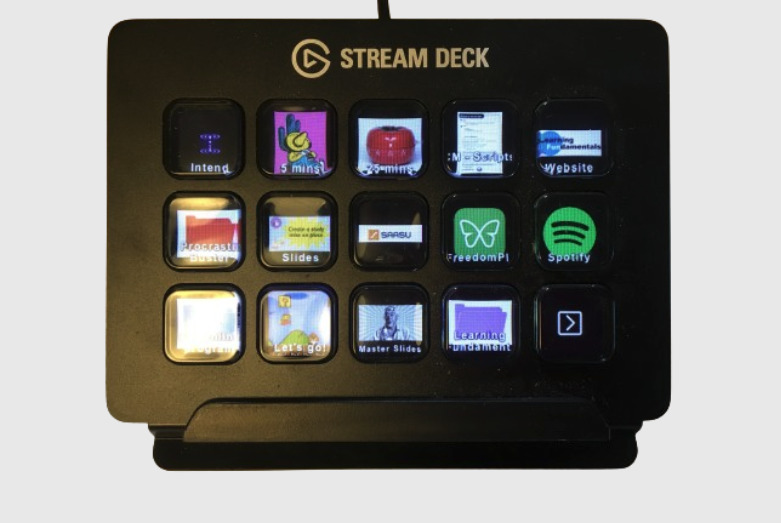
Technically, this is a gaming device that allows gamers who stream to switch scenes, adjust audio, etc at the tap of a button. I’m not a gamer, but I use my Stream deck to get started with various tasks and projects I feel resistance towards.
Instead of thinking, “Where is this file located? How do I get to it?” I tap a button on the Stream deck and it opens the file up. I tap another button, and it opens an application I frequently use.
No more frustrating clicking through numerous folders trying to find the document I need! The Stream deck helps to remove a big mental barrier and kick-start the work process with ease.
Stream decks aren’t cheap but if you can find one secondhand or on special like I did, they are well worth it.
Staying hydrated is super important. I fill a big jug with water every morning and place it on my desk with a glass. If water is within arm’s reach and I can see it, I find myself taking regular sips throughout the day.
I used nasty, cheap pens for years. Being a sucker for free stuff, I collected free pens at career expos and university open days. Without even realising it, these pens caused me a great deal of frustration and irritation.
These days, when it comes to pens, I don’t mess around with junk. There’s one pen I love using: the uniball signo (0.7). It’s a gel pen (you can find them at Officeworks). Writing with this pen is an absolute pleasure.
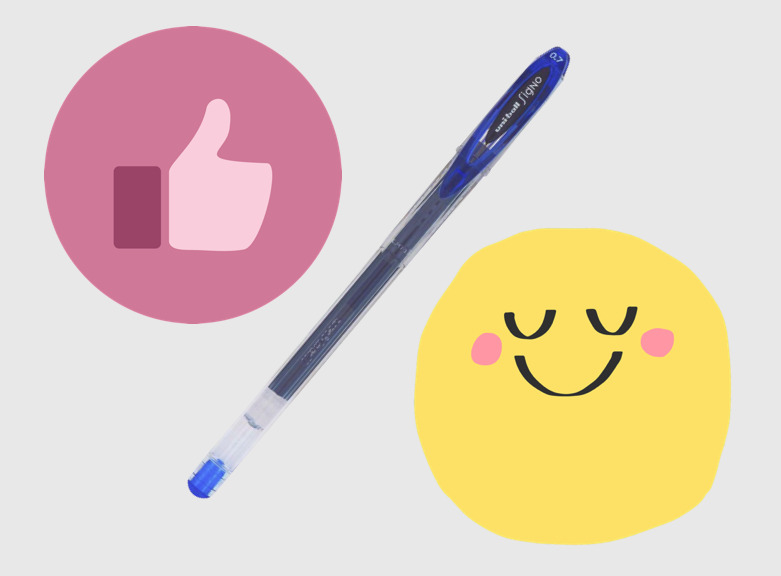
As Kevin Kelly says:
“Take note if you find yourself wondering “Where is my good knife?” or “Where is my good pen?” That means you have bad ones. Get rid of those.”
It’s super handy to have a notepad to jot down ideas and random thoughts as they arise. I recently discovered Rhodia notepads (a recommendation by The Pen Addict, Brad Dowdy). Writing on this paper feels like writing on butter!

Whenever I notice I’m procrastinating, I’ll set my timer for 10 minutes and say, “All I need to do is 10 minutes on this task. That’s all. Just 10 minutes”. I set the timer and away I go.
Other times, when my workspace looks like a mess, I’ll set a timer for 3 minutes and spend that time getting things back in order.
My planner tells me what to do and when to do it. For the last 6 weeks, I have been experimenting with Cal Newport’s time blocking method (planning my day in hourly blocks). It sounds torturous, but it’s strangely liberating.
When I open my planner, I can see what is happening for the week, but I don’t have a sense of the bigger picture. This is why I printed out a massive (A0 size) year-in-a-glance planner to schedule all my presentations, holiday breaks, special events, etc.
Having this calendar makes me feel more in control of my life. I can see when I have busy periods of presenting and when I need to balance those periods with extra rest time to sustain myself. I can also see events and deadlines relatively to where I am now.
These are just a few things I love having in my study/work mise en place. But we’re all different, so you need to figure out what works best for you.
When I recently asked a group of high school students what items they would need in their study mise en place, here’s what they came up with:
• Snacks
• Phone
• Pencil case
• Squishmallows
The first three suggestions didn’t surprise me, but the squishmallows sure did (the students were shocked that I’d never heard of a squishmallow before). I had to google them (they are soft toys).

But I get it.
A squishmallow is fun.
It’s comforting.
It makes you feel good.
If something makes you feel good, go put it on your desk. Because if you feel good, it will be easier to think and learn.
The mise en place is a skill that can help all of us (not just chefs) focus on the task at hand. The point is you need to make your study mise en place work for you. You need to find the combination of ingredients that hits the spot.
Like a top chef has their favourite chopping knife, you’ll have your favourite pen. Spend some time experimenting with various tools and different work setups. By creating a more streamlined and organised study space, you’ll get that time back. Plus, you’ll find it’s much easier to get going and keep going with your work.
Dr Jane Genovese delivers interactive sessions on learning to learn, combating procrastination, exam preparation, how to focus in the age of distraction, habit formation and much, much more!
Get FREE study and life strategies by signing up to our newsletter:
© 2024 Learning Fundamentals